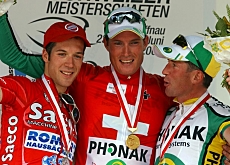Expert calls for doping tests to be updated

The head of the Swiss doping analysis laboratory in Lausanne has said scientists must "refine" their outdated methods of screening for testosterone.
Martial Saugy’s comments come a week after cyclist Floyd Landis, winner of the 2006 Tour de France with Swiss team Phonak, failed a doping test. The result of a second test is expected on Saturday.
Saugy’s central argument is that testosterone levels encountered nowadays are no longer “massive” like they were in the 1980s when the tests were introduced.
“That is no longer the situation and I therefore believe the entire anti-doping strategy regarding testosterone must be changed,” said Saugy, whose laboratory at Lausanne University’s Institute for Forensic Medicine is regularly used by the International Olympic Committee and Uefa, European football’s governing body.
Saugy says laboratories should be supported in their efforts to pursue new screening methods that are tailored to individual athletes and that look at a wider range of markers than at present.
Research by the Lausanne laboratory, which is accredited by the World Anti-Doping Agency (Wada), indicates that there is significant variation in how the body absorbs and reacts to additional doses of testosterone.
“Athletes are not all equal before testosterone doping,” Saugy told Swiss radio, calling on Wada to make the necessary changes quickly in order to keep ahead in the race between testers and takers.
“Wada needs to be more reactive – as reactive as the world of doping – and to put in place systems that enable the [sporting] federations to be more efficient.”
Natural metabolism?
On Saturday Landis is expected to get the result of a second doping test from the Châtenay-Malabry laboratory in France which could trigger hearings into whether he should be stripped of his Tour de France title.
On July 27 the 30-year-old tested positive for an unusually high ratio of testosterone to another hormone epitestosterone after a tough mountain stage on July 20, when he pulled off a remarkable comeback just a day after a poor performance.
Humans typically have a testosterone-epitestosterone ratio of 1:1 or 2:1. If an athlete’s level exceeds 4:1, the test to look for synthetic testosterone is administered. Landis measured 11:1.
If the “B” sample is negative, Landis will be cleared – although doubts will inevitably linger. If positive, he could become the first winner of cycling’s most prestigious race to lose the crown in a doping case. Oscar Pereiro of Spain, the runner-up, would then be declared the winner.
Landis could also be fired by his Swiss Phonak team and face a two-year ban from racing.
The United States rider has insisted that his body’s natural metabolism is responsible for the test result, but recent reports that his “A” sample showed some of the testosterone in his system was synthetic – meaning it was ingested – have put his defence into question.
Phonak
In a sport riven by doping scandals, Landis’s team stands out. Several riders for the Swiss-based Phonak team have been involved in drug cases, including US rider Tyler Hamilton, winner of the time trial gold medal at the 2004 Athens Olympics.
In March 2006 Swiss rider Sascha Urweider was suspended following a positive test for high levels of testosterone and in 2004 three Phonak riders – Hamilton, Oscar Camenzind and Santiago Perez – were all found guilty of doping violations and fired.
Phonak, a Swiss hearing-aid firm, has confirmed its decision to pull out of cycling sponsorship, citing continuing doping issues. It will be replaced at the end of the season by iShares, a subsidiary of Barclays Bank.
“Think hard before you get involved in cycling, because there are never any guarantees when it comes to doping,” said Andy Rihs, owner of Phonak. “Where there’s money, there’s doping.”
swissinfo, Thomas Stephens
On July 27 it was announced that a test on Landis after Stage 17 on July 20 showed an “unusually high” level of testosterone in his urine.
On August 1 reports said synthetic testosterone had been found, throwing doubts on his claims that it was a natural occurrence.
In March 2006 Swiss Phonak rider Sascha Urweider was suspended following a positive test for high levels of testosterone.
In 2004 three Phonak riders were all found guilty of doping violations and fired: Tyler Hamilton and Santiago Perez (blood doping) and Oscar Camenzind (EPO).
Testosterone is a naturally occurring male hormone and an anabolic steroid.
Most scientists believe that when athletes take synthetic testosterone to boost performance it helps them get stronger, recover faster from workouts, prevent tissue breakdown and increase their assertiveness.
Testosterone can be injected, although athletes are moving toward taking it by skin patch or cream, which allows lower doses that might escape detection.

In compliance with the JTI standards
More: SWI swissinfo.ch certified by the Journalism Trust Initiative













You can find an overview of ongoing debates with our journalists here . Please join us!
If you want to start a conversation about a topic raised in this article or want to report factual errors, email us at english@swissinfo.ch.